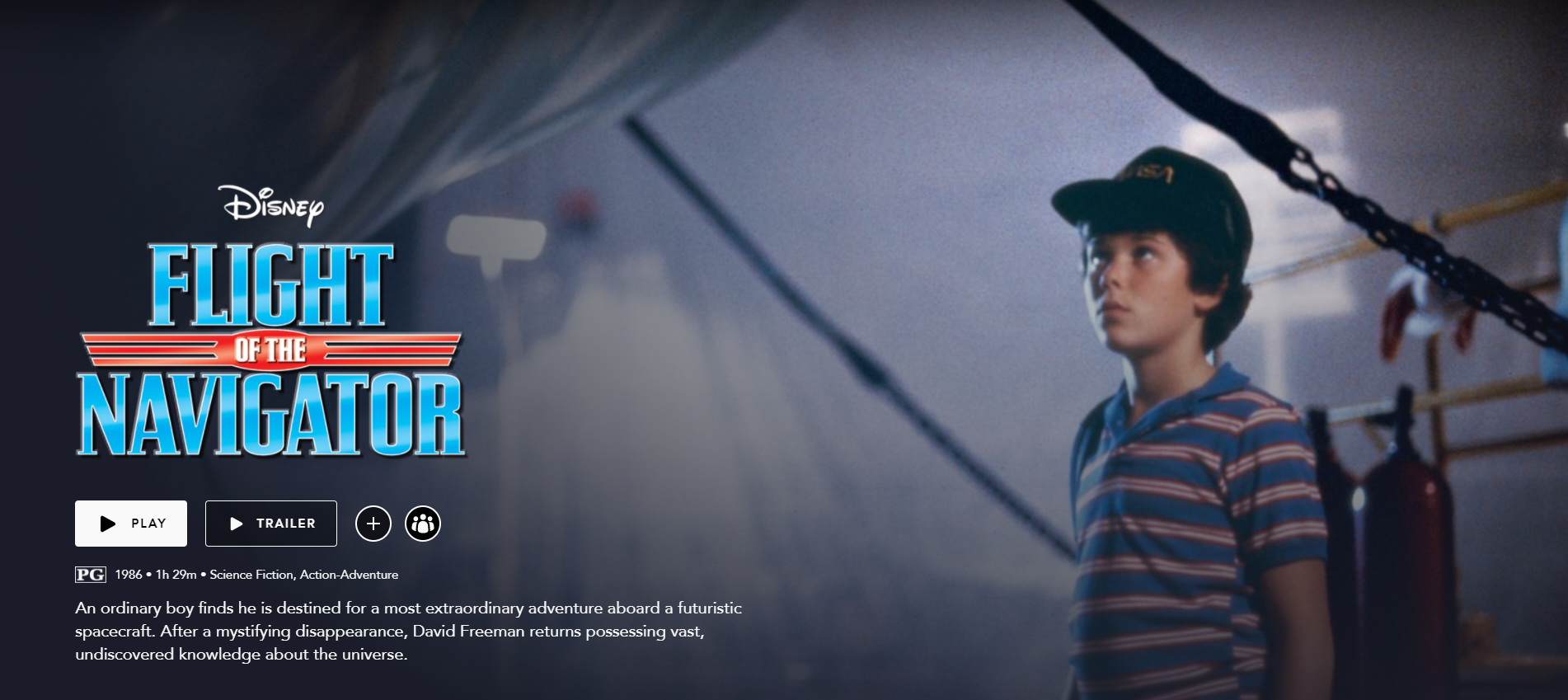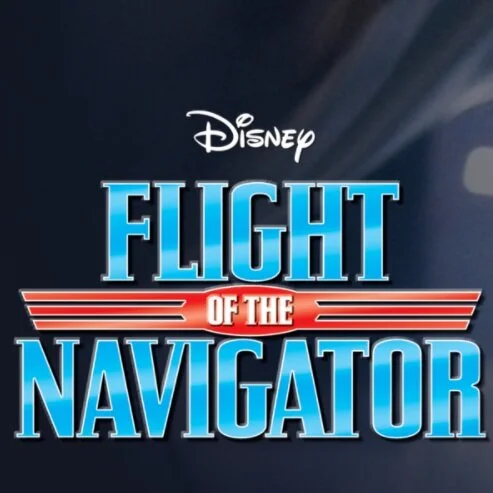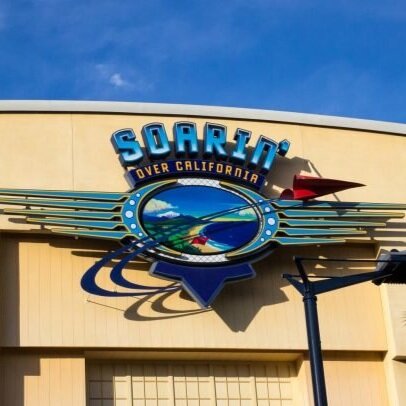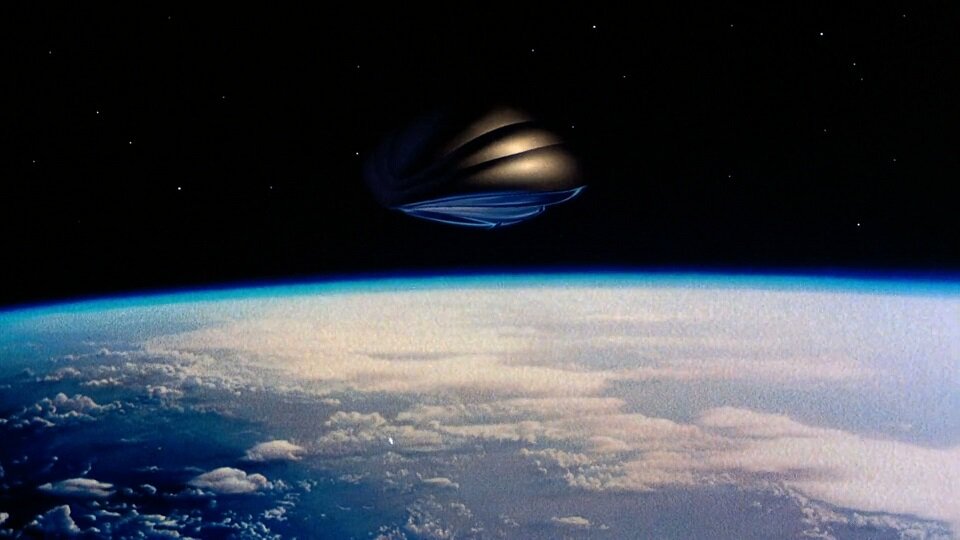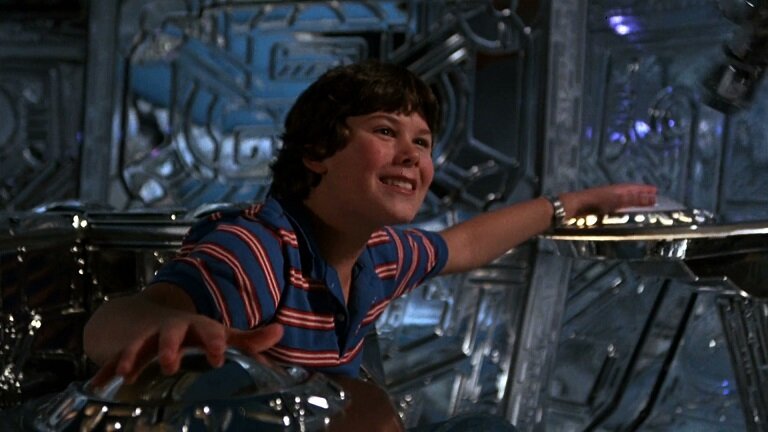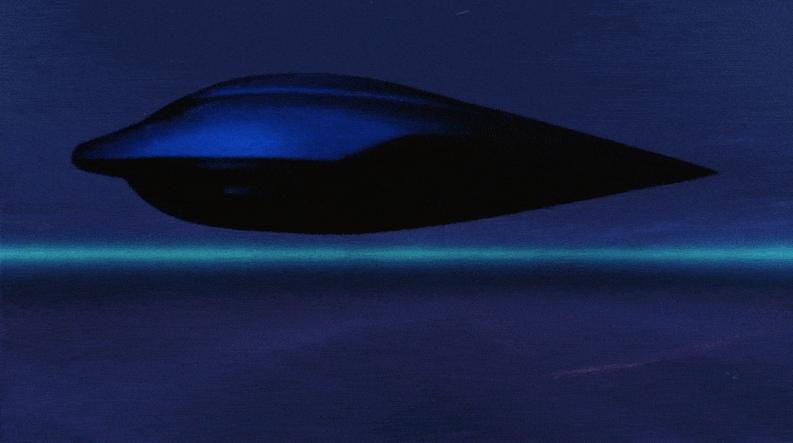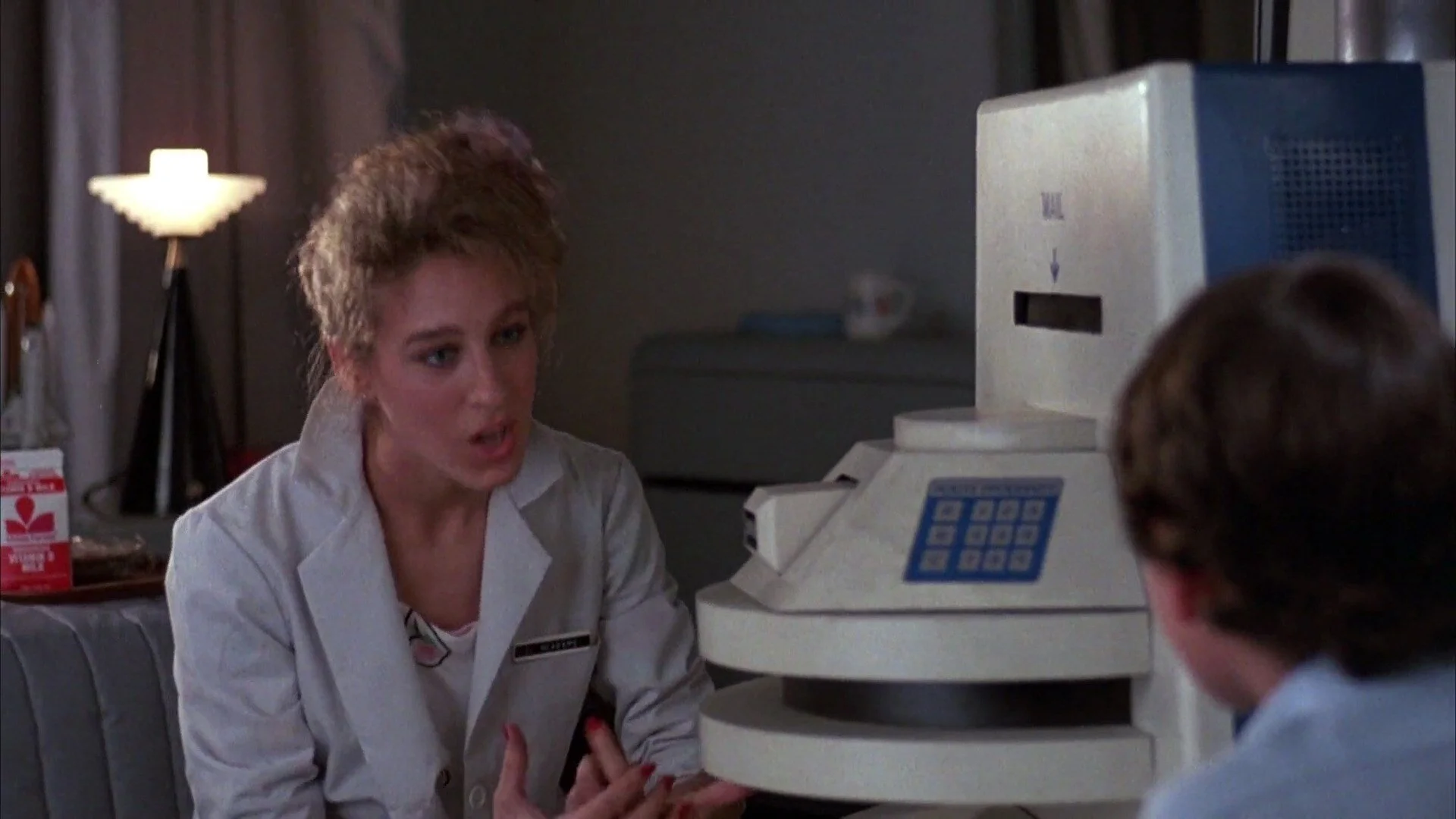Review: Flight of the Navigator (DMC #81)
Hope you like sci-fi! This week we watched Disney’s Flight of the Navigator, the 81st film in our Disnerd Movie Challenge. While we do like our sci-fi films, this one feels like it belongs back in the ‘70s with Disney’s previous attempts at sci-fi. If you’ve never seen this film before, save yourself the trouble of watching and just read our synopsis. If you have seen this before, skip ahead to read our review and join the discussion.
Synopsis
An object that looks like a flying saucer hovers over the city. It’s revealed to actually be a frisbee which is caught by a dog at the July 4th, 1978, South Florida Frisbee Competition where a 12-year-old boy named David is trying to teach his dog, Bruiser, how to catch a frisbee. His younger brother, 8-year-old Jeff, teases him about it and continues to pester him as the boys and their parents climb into their car. They drop Jeff off at his friend Billy’s house, and on the drive home David’s parents try to convince David to be kind to his little brother. Once home, David awkwardly says hi to his crush, Jennifer, and then runs up to his room to use his telescope to spy on her. David’s dad catches him and suggests David go and talk to Jennifer. Later, David’s mom tells David to go fetch his brother so he’s not walking home alone through the woods after dark. David takes Bruiser with him, but the dog seems uneasy about something in the woods. David, too, grows uneasy as he keeps hearing strange noises in the dark. When Jeff jumps out and scares David, David is ready to pummel him, but Bruiser seems distracted by something. When David goes to see what Bruiser found, he falls into a ravine. When David comes to, Bruiser is nowhere to be found. He climbs out of the ravine and makes his way home, but when he returns to his house, a strange woman named Janet opens the door, telling David that this is her home, and David must have the wrong address. As David freaks out, Janet’s husband Larry calls the police.
At the police station, David overhears the cops talking about how David fits the exact description of a missing person report filed years ago, but he was missing so long he was declared legally dead. The cops ask David what year he thinks it is—he tells them it’s 1978. The cops take him to a house David has never seen before, where David’s parents, now visibly older, answer the door and celebrate David’s return. David passes out from the shock of it all. Somewhere else in Florida, a floating UFO struck a series of electrical towers and knocked out the power. NASA scientists are sent to investigate it. Meanwhile, David’s parents take him to a hospital for testing. David’s younger brother, Jeff, meets the family at the hospital, only he’s not an 8-year-old anymore—he’s sixteen. Jeff gently explains to David that he was missing for eight years. The year is now 1986. David, scared, takes comfort in his now older little brother. The doctor wants David to stay at the hospital for further testing, but David just wants to go home. His family agrees to stay with him in shifts so he won’t be alone. That night, a NASA truck transports the UFO to a secure hangar. Miles away at the hospital, David hears a voice in his head calling for help. David wakes up and tells Jeff about what he heard, but Jeff reassures him it was just a bad dream. Back at the hangar, the scientists are unable to get inside the UFO, and they’re worried something could be inside it—perhaps even dying. Back at the hospital, David undergoes tests of his brain activity and he unintentionally communicates directly with the computer in binary code, drawing a diagram of the UFO that was found. When NASA gets wind of it, they invite David to go with them, but David doesn’t want to go, and his dad supports his decision. However, when NASA’s Dr. Faraday offers David a chance to uncover the truth of what happened to him, David agrees.
At NASA’s facility, David again hears the voice. He’s shown to a room full of toys, but David notes there’s no phone. Dr. Faraday tells him all phone calls home will be made with his supervision. David is locked in his room. A mail robot called R.A.L.F. enters with intern Carolyn McAdams who brings food for David. She promises to get David a big mac, fries, and a coke next time she comes. David calls home with Dr. Faraday to tell his parents he misses them and let them know how he’s being treated at NASA. Later, the scientists have David undergo tests. When they ask David what he remembers about the night he disappeared, the computers go haywire. It turns out the computers can read his mind and respond to the scientists’ questions. Without David’s input, his brainwaves tell the computer and the scientists that David traveled beyond the speed of light to the planet Phaelon, which is identified on a star map. David freaks out about his brain knowing things he can’t remember and runs back to his room. When Carolyn comes to visit him, he tells her at least he’s going home tomorrow, but Carolyn reports that can’t be true because he’s on the mail sheet for the whole week. David steps out of view of the two-way mirror so the security guards can’t see him and whispers to Carolyn to contact his parents and help him escape. She covertly agrees. That night, David again hears the voice—this time more distinctly saying “help me.” When R.A.L.F. next comes to David’s room, he sneaks into the robot’s storage compartment and R.A.L.F. delivers him to the hangar where the UFO is being kept. When David comes face to face with the UFO, the spacecraft opens a stairway for David to climb inside. David enters, and a voice inside the ship calls David “Navigator,” revealing that David has the information this voice requires to complete his mission. David’s brain was programmed with star charts, which makes him the Navigator. NASA’s security team belatedly realizes the stairway to the UFO has opened and mounts a full-scale response. The scientists and security team find David inside the spacecraft and draw their weapons. David tells the spaceship to close the door and depart, and the ship obeys, flying off away from the facility.
The ship wants to go back to Phaelon, but David disagrees. He wants to go to his home. After a few failed attempts, he figures out how to give navigation instructions to the spacecraft. The craft tells David that he was sent to sample lifeforms for studying and he chose David, but unfortunately it became clear that it was too dangerous to send a human back in time, so David was returned 8 years later instead of at the exact time and place of his original disappearance. David makes a deal with the ship: he’ll give the star charts if the ship takes him home. The ship introduces himself as “Trimaxion Drone Ship” and David decides to call him Max for short. Max shows David other alien lifeforms he’s collected on his travels, including a little orphan critter that can no longer return home because his planet was destroyed. Meanwhile, David’s dad calls Dr. Faraday, and Dr. Faraday chooses his words carefully to avoid telling David’s parents the truth of what just happened. When the call ends, the scientists tell Dr. Faraday that the intern, Carolyn, was the last person to see David before he snuck onto the UFO. Back on the spaceship, Max is ready to perform the mind transfer, but he admits it’s his first time doing it. Though the scan is over quickly and painlessly, Max accidentally downloads bits of David’s human traits and personality, too, giving Max a whole new persona. After David makes fun of Max, Max sasses back that if David is so smart, he should fly the spaceship. Max gives up all control and the ship begins to freefall until David manages to find the right controls to pull up and steer the ship where he wants it to go.
Meanwhile, Carolyn arrives at David’s family’s home to tell them the truth. Other NASA scientists arrive at the house and corner Carolyn as she tries to sneak out the back door. Dr. Faraday requests that David’s family stay confined to their home. Back in the spaceship, David accidentally steers them into Tokyo before finding the way to San Francisco and finally setting a course for Florida. In Texas, David disembarks the spaceship to use a pay phone to call home. Jeff answers the phone and hides the call from the NASA team as David tells Jeff to make some sort of signal David can see from the sky so he can find the house. David uses a map from the convenience store to plot a course for Florida while Jeff secretly works on a signal: he’ll set off a box of fireworks from the roof of the family’s home. The firework signal works, and David is able to find his family’s home, but NASA has been tracking the UFO’s flight path and the house is swarmed with armed authorities when David arrives. David realizes he doesn’t belong in the current time anymore and begs Max to take him back in time, despite the risks. If he stays in 1986, he’ll be a lab rat for the rest of his life. David tells Max he’ll miss him, and Max wishes David good luck before taking him back to 1978. David wakes up back in the woods at the bottom of the ravine. He runs home where he finds his parents and brother already waiting for him out on a boat to go watch the July 4th fireworks. They call him over, and David is glad to see his family just as they were before. He hugs his mom and tells her he loves her, and he tells Jeff that he loves him too, much to everyone’s surprise. As David settles into the boat, the small orphaned alien critter he befriended on the spaceship emerges from David’s backpack. David signals to Jeff to keep the critter a secret. As the family sails out on their boat, Max flies through the fireworks display and calls “See you later, navigator!”
Thoughts Before Watching
Megan: I’m honestly not looking forward to this film. It looks too similar to the dull sci-fi Disney films of the 1970s. Initially I had thought perhaps this had some connection to the Soarin’ Over California or Soarin’ Around the World attractions from Disneyland’s California Adventure theme park (and other Disney theme parks). The logo for Flight of the Navigator seemed reminiscent of some of the pre-show elements seen while waiting in line for the Soarin’ rides. After reading the description, though, I don’t think this film can possibly have any link to the rides since the rides don’t have any sci-fi or UFO elements to them.
Kevin: I was in the same boat of thinking this film had a connection to those rides. It would have been kind of cool had that been true. Anyway, I’ve never heard of this one, so I did a brief bit of research before we got started. Something that caught my attention is that Disney didn’t produce this; they only distributed it back when their distribution division was still called Buena Vista. The reason I bring this up is because I find it slightly amusing that there are other films that were distributed by Buena Vista, while not produced by Disney, that can be found on Disney Plus, and yet as of writing this they don’t have the classic Disney logo attached to them (i.e. Turner & Hooch). I wonder what it is about Flight of the Navigator that makes it an exception. Although I’m trying not to judge this before I watch it, I’m already anticipating this will be too much like the ‘70s films we were so happy to move past.
Thoughts After Watching
Slightly better than many of its sci-fi predecessors
Kevin: There isn’t a lot about this that was great. With that said, I think Flight of the Navigator is more entertaining than a lot of the sci-fi films we watched previously in this challenge. Off the top of my head, I would say only Tron, Escape to Witch Mountain, and Return from Witch Mountain surpass it. I agree that there isn’t much of a story here and that what little story is here is messy. But, at least this isn’t a bloated dystopia like The Black Hole, nor is it trying to be a silly mix of slapstick and hokey science like Million Dollar Duck or any of those earlier movies with Kurt Russell. I can see why many children growing up in the ‘80s enjoyed Flight of the Navigator and still love it to this day. Where the ‘70s films either used science as a form of comedy or attempted to make some grand space adventure, this film appears to target the audience’s sense of wonder and curiosity. The fact is, this film feels a lot more grounded in reality. Although a robot that’s as high-tech as Max and the idea of time travel are still fictional concepts (though our advances in technology may soon make robots like Max a reality), the movie makes these things feel completely real, especially because they appeal to real-life concepts and ideas about spacetime and the speed of light. The technology that made up both Max and the ship are cool as well, and I’d be lying if I said I didn’t envy David getting to hang out in that ship and fly off into space. As someone with an interest in astronomy and cosmology, all of the NASA, spacecraft, and time travel stuff were my favorite things about the film. While it’s true that some of the other films we watched used these ideas, my suspension of disbelief just couldn’t stretch that far. This movie does a better job, and I am left wondering if I would have enjoyed it a lot more had I seen it as a kid when I was just beginning my interest in space. Unfortunately, the lack of story and characters we could really connect with means that there is little substance at the end of the day.
A fairly strong ensemble of actors
Kevin: In spite of not having any characters to connect with, Flight of the Navigator does boast some good acting. It’s just that we don’t really get to understand the characters’ motivations. Still, I have to give it to this cast for putting in some solid performances. First, there’s the lead actor Joey Cramer as David. The movie’s plot falls almost entirely on this kid’s shoulders, and that is not an easy feat. One particular standout to me was when David broke down crying on the staircase of his former home as Janet and Larry try to help him. Cramer did very well in that scene, and I fully bought how scared and confused David was in that moment. Cramer hasn’t had many roles since, and unfortunately has been in some legal trouble throughout his life, including robbing a bank. It’s a shame, but at least he has this role and film to his credit. Sarah Jessica Parker is similarly great as Carolyn. I haven’t seen too many of her films, but I strongly remember her performance in Hocus Pocus, and so seeing her in this movie just showed how much versatility she has as an actress. Paul Reubens (credited in this movie as “Paul Mall”) was a bit of a shock as Max. Reubens is, of course, probably most well known for his roles as Pee-Wee Herman. I’ve only seen Pee-Wee Herman clips instead of full shows, but I am familiar with the character’s voice. Having never actually heard Reubens’ non-Pee-Wee voice, I didn’t quite believe it was him until the moment Max began acting more human and started talking in that familiar voice. Even though he was acting as a faceless robot, Reubens ended up providing some interesting personality to Max.
Send this back in time
Megan: This film may have been released in 1986, but it feels like it really belongs back in 1978 with the other failed sci-fi films of Disney’s past. After coming off a film like The Great Mouse Detective, which had such a well-developed plot structure, this film’s plot seems like a hot mess. Too much of the film feels like the “Fun & Games” story beat (using the Save the Cat structure). With all the antics of learning to fly the spacecraft and traveling around the country with a UFO, there isn’t as much screen time devoted to David’s actual character arc. Sure, we see that David starts out as a kid who’s annoyed by his little brother, and in the end he comes to love his little brother, but the film spends so little time focusing on the relationship between David and Jeff that the ultimate change within David at the end of the film doesn’t land as strongly as I felt it should. Had 16-year-old Jeff accompanied David throughout more of his journey, perhaps I would buy it more. As it stands, however, this film seems like one big “Fun & Games” sequence of what happens when a 12-year-old boy gets to fly a UFO rather than a character-driven story about a 12-year-old boy learning to love and appreciate the family and the life he has. (Seriously, this film could have learned a lot if it had followed the plot template of The Wizard of Oz.)
Bechdel Test Fail
Megan: Another reason to send this film back in time? It fails the Bechdel test. Not even Sarah Jessica Parker's hip and cool NASA intern character, Carolyn, can help this film pass the Bechdel test. Is she a named female character in a STEM field? Yes. But does she ever talk to a named female character about something other than a male character? Nope! The only time she speaks to another woman throughout the entire film is when she speaks to David’s mom and dad to tell them that David is currently flying around in a UFO. Also, despite Carolyn being a woman in a STEM field (she’s an intern at NASA!!!), she’s still clearly working in a male-dominated field where she doesn’t have the same level of power or respect as her male peers. Now, some of her lack of power is that she’s an intern—she doesn’t have the same clearance as a full-time employee who’s climbed the ranks. However, I have to wonder, were the male interns also assigned to mail duty? Or was that clerical task specifically saved for the female intern while all the male interns got to do cool science stuff? Also, did anyone else notice how quick the NASA team was to blame the lone female intern for David’s escape rather than the two male security guards whose literal job was to keep an eye on the boy? Yeah…sexism much?
Also sexist? The way David spies on his crush, Jennifer, with his telescope. While I appreciated that David’s dad caught him in the act and tried to redirect David down a healthier path to forming a relationship with his crush, I still wanted the dad to make it clear that spying on a girl was unacceptable. It’s such a small thing, and Jennifer never comes back into the film beyond when we see her in that opening act, so I have to wonder, why even have her in the film in the first place? I’m all for having more named female characters in films, but if they’re only there to be an object of desire for a male character, then no thank you!
